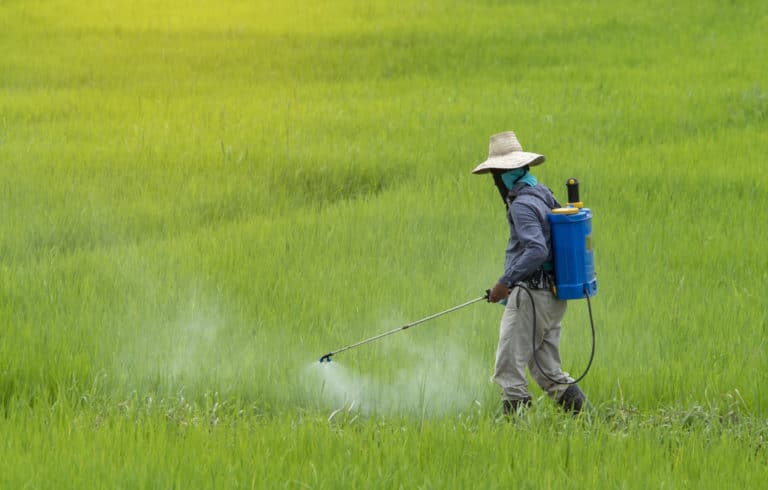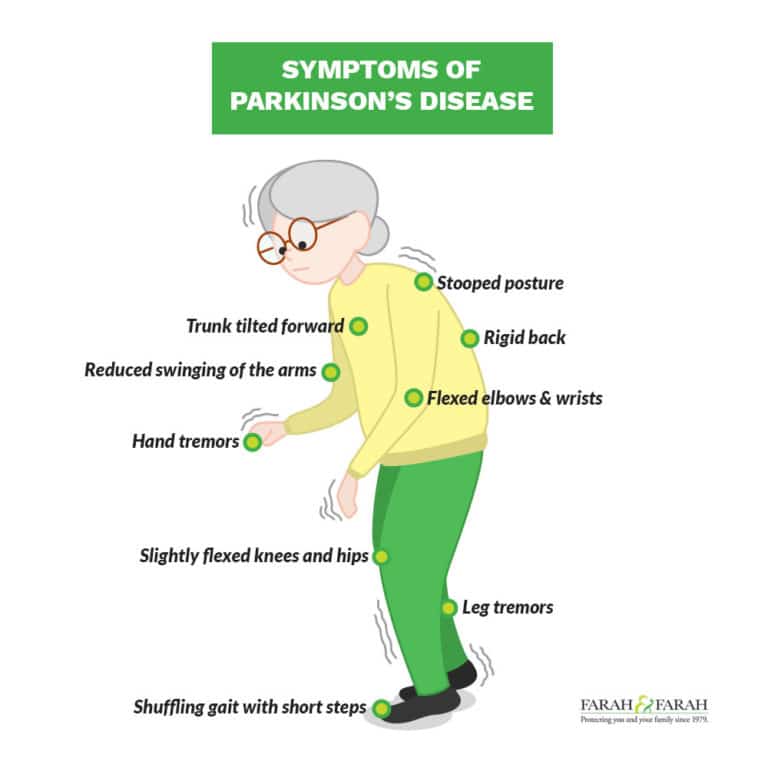Paraquat Side Effects Lawsuit
Paraquat is widely used across the United States by commercial farms. Although it’s restricted to use only by those with a commercial license and is banned from residential areas, those working with the herbicide are still at risk of exposure to the toxic chemical. Paraquat has been linked to an increased risk of Parkinson’s disease. Those who have worked with paraquat are 250% more likely to develop Parkinson’s disease than those who don’t.

FREE CASE REVIEW
Home > Product Liability Attorneys > Paraquat Side Effects Lawsuit
Despite the increased risk of Parkinson’s, the EPA continues to allow the use of paraquat. Researchers believe that the EPA guidelines are based on a single exposure to a large amount of paraquat, rather than repeated exposures of small amounts over a long period of time, such as what a crop-duster on a commercial farm would experience.
If you have Parkinson’s disease and were repeatedly exposed to paraquat, you may have a case against the manufacturer or against the EPA. Lawsuits are pending against the manufacturers of paraquat for failing to adequately warn of the health risks of long-term exposure to the herbicide. Others are seeking legal options to require the EPA to ban paraquat from use altogether within the United States. Contact Farah & Farah today for a free consultation to see if you have a case. You won’t pay anything unless your case is successful.

What Is a Herbicide?
An herbicide, also known as a weed killer, is a substance that is used to get rid of weeds and other unwanted plants. Some types of herbicides are described as organic, which means that they’re designed for use on organic plants, rather than that they’re necessarily organic themselves. Other herbicides contain multiple methods of action in order to combat weeds that are growing herbicide-resistant. Still, other herbicides are also pesticides.
What Is Paraquat?
Paraquat is a type of herbicide. It’s a chemical compound in the viologen family and is technically a type of salt. Paraquat is one of the most commonly used types of herbicide. It kills plants upon contact but is also toxic to humans and to animals because paraquat is redox-active. Redox is a chemical reaction in which atoms have their states of oxidation changed.
There are some benefits to using paraquat that contribute to its wide use:
- Fast-acting
- Rain-fast within minutes of application
- Kills a wide range of weeds and grasses
- Partly deactivated upon contact with soil
Who Uses Paraquat?
Paraquat is sold in the United States as a liquid herbicide, but is restricted by the Environmental Protection Agency (EPA). This means that only those with the appropriate license can use paraquat as an herbicide. An individual with a weed problem most likely won’t qualify for such a license. Typically, paraquat is used by commercial farming enterprises rather than by individuals. The restrictions are there because paraquat is toxic. Despite this toxicity, paraquat is used around the world, in larger quantities in countries with fewer regulations. Some countries have banned it altogether, however, including European nations that are members of the European Union (EU).
PARAQUAT SAFEGUARDS
Because of its toxicity to humans, paraquat, when sold in the United States, has several safeguards added to it in order to protect people who might come into contact with it. Firstly, it’s dyed blue so that it can’t be mistaken for a beverage and then accidentally ingested. Secondly, it’s got a very sharp odor to it so that it’s readily apparent that it is not edible. Thirdly, there’s an added compound to induce vomiting should accidental ingestion occur.
However, other countries may not have the same safeguards that the United States does.
How Can Someone Be Exposed to Paraquat?
Some herbicides are used as chemical weapons in war, but that hasn’t thus far been the case with paraquat, despite its toxicity to humans and animals. Individuals can be exposed to paraquat in three ways:
- Eating or drinking food contaminated with untreated paraquat
- Through the skin
- Inhalation
This means that those actually applying paraquat who are commercially licensed to do so are at the highest risk of exposure to the herbicide. Paraquat is dangerous to humans because the herbicide first spreads throughout the body no matter where it entered the body and can cause chemical reactions all over, but primarily in the kidneys, lungs, and the liver.
Symptoms of Paraquat Exposure
What symptoms and health problems occur after exposure to paraquat depends on how much a person was exposed to. If someone was exposed to a smaller amount of the herbicide, then that person may experience the following in the days and weeks following their exposure:
- Scarring in the lungs
- Failure of the liver
- Failure of the kidneys
- Failure of the heart
Exposure to large amounts of paraquat via ingestion can have immediate effects on the body:
- Pain and swelling in the throat or mouth
- Vomiting
- Diarrhea (possibly bloody)
- Nausea
- Abdominal pain
After a few hours or a few days, the symptoms could include:
- Coma
- Confusion
- Rapid heartbeat
- Fluid in the lungs
- Muscle weakness
- Heart injury
- Seizures
- Respiratory failure
- Scarring in the lungs
- And more
The possible long-term effects of paraquat ingestion can include organ failures, scarring in the esophagus making it difficult to swallow, and even death.
How to Prevent Paraquat Exposure
Because paraquat is so toxic, it’s vital for those who work with it to minimize their risk of exposure. It’s toxic when ingested, so those who work on commercial farms should wear a face covering to prevent accidental ingestion.
What to Do If You’ve Been Exposed to Paraquat Externally
If you have been exposed to paraquat through your skin, it’s important to immediately take action to minimize the possible health risks that can arise.
- Remove all clothing that was exposed to paraquat
- Thoroughly wash with soap and water
- Dispose of the contaminated clothing without touching the paraquat (plastic bag within a plastic bag)
- Call emergency health services and inform them of the exposure (they should dispose of the contaminated clothing safely)
- Seek medical treatment
How Is Paraquat Herbicide Linked to Parkinson’s Disease?
The third method of exposure to paraquat’s toxicity is by inhalation. The inhalation of paraquat has been linked to an increased risk of developing Parkinson’s disease. Dutch neurologist and professor Bastiaan Bloem has warned that due to exposure to paraquat, the number of people with Parkinson’s disease will most likely double over the next twenty years, increasing from the about 6.5 million today to about 13 million people.
Bloem says that neurological conditions such as Alzheimer’s disease are increasing across the world because people are living longer. However, Parkinson’s disease is the only neurological condition that is accelerating beyond what would be expected due to the aging effect. Farmers and agricultural workers are at a much higher risk for developing Parkinson’s because there’s a much higher rate of exposure to paraquat.
STUDIES LINKING PARAQUAT INHALATION TO PARKINSON’S DISEASE
Researchers at the University of Rochester in New York performed a study on mice to determine the effects of inhaling small amounts of paraquat over a long period of time. They designed the study because they felt that the current CDC guidelines and regulations regarding paraquat usage were based around exposure to large amounts of the chemical at once rather than small amounts over time, which is how most agricultural workers and farmers would be exposed.
The University of Rochester researchers found the exposure to paraquat changed how the brain processes olfactory information in male mice, changing their sense of smell. This is consistent with symptoms of oncoming Parkinson’s disease. Other studies have found that people exposed to paraquat are 250% more likely to develop Parkinson’s disease than those who are not exposed.
$2+ BILLION IN RESULTS

What Is Parkinson’s Disease?
Parkinson’s disease is a neurological condition that affects the movement of the body. The disease may involve both tremors and stiffness that prevents movement. Typically, the disease begins with tremors in one part of the body, such as in one hand, and difficulty showing expression in the face. There may be some stiffness preventing the arms from swinging. As the disease progresses, the symptoms worsen. There’s also no cure for Parkinson’s disease, although symptoms can typically be managed with medication.
Parkinson’s disease affects neurons in the brain, causing them to die. This causes tremors and stiffness because there are fewer neurons to produce the chemical dopamine, which is required for normal brain functions. With the amount of dopamine in the brain decreased, the brain functions abnormally, and certain movements are altered or restricted as a result.
Symptoms of Parkinson’s Disease
No two people may experience the symptoms of Parkinson’s disease in the same way. In the early stages of the disease, the symptoms may actually be so mild that they go unnoticed. The symptoms may also begin only on one side of the body before progressing to the other. If this occurs, symptoms are generally more severe on that side, even after both sides of the body experience the symptoms.
Symptoms of Parkinson’s disease typically include:
- Tremors
- Rigid muscles
- Impaired balance
- Impaired posture
- Slow movements
- Changes in speech
- Changes in writing
- Decreased ability to perform automatic movements, such as blinking, smiling or Arm swinging while walking

Risk Factors of Parkinson’s Disease
There are some risk factors that can increase your chances of developing Parkinson’s disease. These include:
- Age
- Being male
- Genes
- Exposure to herbicides
- Exposure to pesticides
Causes of Parkinson’s Disease
The exact cause of Parkinson’s disease isn’t known. However, there are two factors that have been identified as playing a role in whether or not someone develops Parkinson’s disease. These are genes and environmental triggers.
GENES THAT TRIGGER PARKINSON’S DISEASE
It’s not actually the genes themselves that are linked to Parkinson’s disease, but a mutation of genes. This mutation is uncommon, except in those who are related to someone with Parkinson’s disease. These gene markers don’t necessarily cause Parkinson’s disease but are considered markers of an increased risk of developing the disease.
ENVIRONMENTAL TRIGGERS FOR PARKINSON’S DISEASE
Certain toxins, such as paraquat, can increase the risk of developing Parkinson’s disease later on.
Risk Factors of Parkinson’s Disease
Researchers into Parkinson’s disease have found that there are certain changes that occur in the brain that indicate Parkinson’s disease. These indicators are:
- Lewy bodies
- Alpha-synuclein in Lewy bodies
It’s not yet known exactly how these indicators are related to Parkinson’s disease, but researchers are focusing their attention on them because they believe that they’re important clues into what actually causes Parkinson’s disease to occur.
Lewy bodies are clumps of substances within the brain. While they can contain different substances, the substance Parkinson’s disease researchers are most interested in is alpha-synuclein, which can be found in all Lewy bodies and can’t be broken down.
What Health Complications Are Caused by Parkinson’s Disease?
On top of the symptoms of tremors and movement restrictions, Parkinson’s disease can cause additional health complications. These complications can include:
- Depression
- Emotional changes
- Difficulty thinking
- Difficulty eating
- Problems swallowing
- Problems chewing (Problems chewing and swallowing can lead to choking and poor nutrition)
- Problems sleeping
- Sleeping disorders
- Constipation
- Bladder issues
- Pain
- Fatigue
- Sexual dysfunction
- Changes in blood pressure
- Problems with the sense of smell
Paraquat Lawsuits
Several lawsuits have been filed that pertain to exposure to paraquat. What the filers of the lawsuit have in common is that they developed Parkinson’s disease as a result of that exposure to paraquat. Where the lawsuits differ is in who is being sued. There are two plaintiffs: the manufacturers of paraquat and the EPA.
Paraquat Lawsuits Against the EPA
Despite paraquat being banned in other countries due to its toxicity, it’s merely restricted in use in the United States. The Environmental Protection Agency (EPA) is being called on to ban the use of paraquat outright in the United States. However, currently, paraquat is banned only in residential areas and is restricted to be used only by those with commercial licenses to do so. While no lawsuits as of yet have been settled, many are exploring their legal options to force the EPA to ban paraquat so that no one else has to suffer an increased risk of Parkinson’s disease due to exposure to the chemical, especially because the herbicide isn’t just dangerous to those who work with it. People who eat the food it was used on may also be at risk.
Paraquat Lawsuits Against the Herbicide Manufacturer
The other possible plaintiff for a paraquat lawsuit is the manufacturer of the herbicide. In 2021, an Illinois man Michael K. filed a lawsuit against the manufacturers of paraquat. In the lawsuit, the man claimed that he developed Parkinson’s disease in 2019 as a result of having come into contact with paraquat while working on a farm in Wisconsin and Illinois from 1969 to 1981. He worked as a crop-duster and was therefore repeatedly exposed to paraquat. The lawsuit accuses the manufacturers of paraquat of failing to adequately warn those who use it of the risks. The man also stated that due to aerial spraying of the herbicide could lead to the spray drifting into areas it wasn’t intended to go, which could pose a risk to others.
Over the past three years, lawsuits have been filed against the three manufacturers of paraquat:
- Chevron
- Growmark
- Syngenta
Michael K. is not the only farmworker who developed Parkinson’s disease from contact with paraquat. Dozens have filed lawsuits against the companies that produce the herbicide.
Co-counsel will be associated on these cases.
for the family of a motorcycle rider killed by a driver who ran a red light
for a passenger injured when a truck struck a motorcycle
in the wrongful death of a wife who died in a motorcycle collision with a dump truck
for a rider who suffered a severe leg injury when struck by a car
for a rider injured when a careless driver pulled out in front of the motorcycle
Should I Consider a Paraquat Lawsuit?
If you have developed Parkinson’s disease and were repeatedly exposed to paraquat over a long period of time, you may have a case against the EPA and the manufacturers of paraquat. The manufacturers should warn of the dangers of repeated exposure to paraquat. If you were unaware of the risks associated with exposure to paraquat, a lawsuit can help hold the manufacturer responsible. The EPA should also consider banning the herbicide altogether, rather than simply limiting it because those who work with it are still at risk.
Don’t hesitate to contact Farah & Farah today for a free consultation. We’ll determine whether or not you have a case and help you get the compensation you deserve, which can include the following:
- Medical expenses
- Lost wages
- Pain and suffering

Don’t wait to get the justice you deserve. Contact us today. You won’t have to pay a dime unless your case is successful.
Baby Formula Stomach Problems
Boar’s Head Listeria Outbreak Attorneys
Chemical Hair Straighteners Cancer Lawsuit
Dicamba Cancer Lawsuit
Eye Drops
Firefighting Foam (AFFF)
Premature Baby Formula NEC Lawsuit
Product Liability Attorneys
Product Liability FAQs
Roundup Cancer Lawsuit
Talcum Powder Cancer Lawsuit
Ultra-Processed Foods Lawsuit














FREE CASE REVIEW
